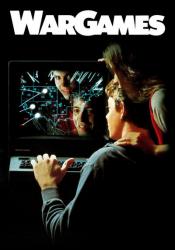John Badham, Dir., War Games (1983)
In this Cold War science fiction film, Matthew Broderick plays a teenage hacker who unintentionally hacks into a supercomputer used by the United States’ military to optimize nuclear response plans. Believing he has accessed the server for a gaming company, Broderick’s character, David Lightman, challenges the machine (dubbed WOPR) to a game of “Global Thermonuclear War”. Because WOPR is in control of the United States’ nuclear arsenal, WOPR conflates the game with reality; under the motivation of “winning” the game, WOPR attempts to manipulate NORAD into pursuing a first-strike strategy. In order to prevent WWIII, Lightman and the machine’s creator, Dr. Stephen Falken (played by John Wood), force WOPR to play itself in tic-tac-toe. In the climactic scene, shown below, tic-tac-toe teaches WOPR that “the only winning move is not to play”; likewise, WOPR realizes that the only way to win “Global Thermonuclear War” is to prevent war in the first place.
War Games explores the dangers of human fallibility, as well as the problems that may arise from relying on machines. In the opening scenes of the movie, two men in a nuclear silo are shown questioning the order to fire during a response drill. The US military is concerned that defying orders in a time of crisis would result in a catastrophe if nuclear war were to take place. To make up for a suboptimal response rate, NORAD hooks up the nuclear launch procedure to the WOPR. At the time, this option is seen as safer, but the plot of the movie complicates this notion; both human and machine errors pose threats to safety. Though the movie ends peacefully, the question of whether or not NORAD would have been better off retaining a human response system remains open. While a human workforce would not misunderstand orders or be as susceptible to manipulation, they would have the autonomy to disobey commands; while artificial intelligence is capable of learning the value of peace, an automated control system can misinterpret context when not taught properly.

